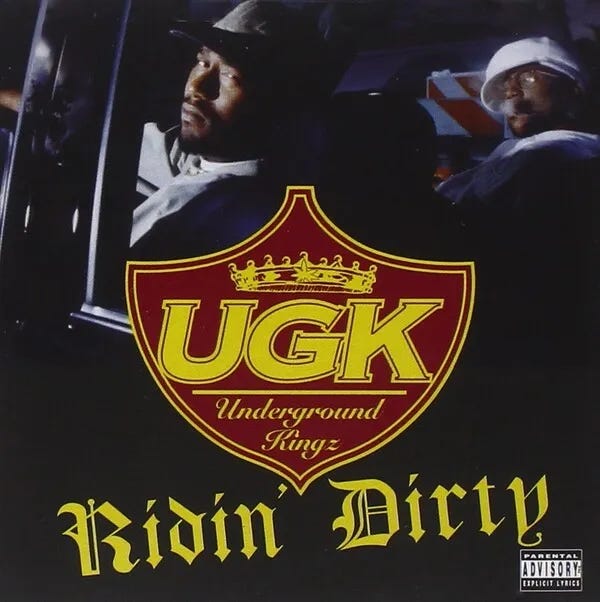Genre of the Day - Dirty South
Album of the Day - Dirty Ridin’ by Underground Kings (UGK) (1996)
May 17, 2024
All things considered, it comes as a bit of a shock that the South had to put itself on the rap scene rather than being a key figure from the start. Today, Atlanta is one of the primary drivers of the genre at-large, especially as it carried trap worldwide. It wasn’t until around twenty-five years into rap’s existence, after West Coast rap and East Coast rap split off into camps, that Southern rappers like UGK catapulted into national spotlight. Though influenced by both coasts, they infused an unmistakable Southern flair with slowed-down beats, the sampled incorporation of funk and soul records, and drum machine-assisted bounce. They showed that the South’s rap was a force to be reckoned with, a bastion of new sounds, and the new torch-bearers of centuries of Southern music that had given birth to so many American genres.
So it supposedly goes that Southerners take pride in their grit and determination, their drawls, and their region’s oft-challenging environment between the heavy, humid summers, muddy swamps, and dusty, unpaved backroads. Compared to those haughty East Coasters or those oblivious West Coasters (jokes, jokes), they might not mind digging their shoes in the dirt. But that’s not really the reason why the genre is called Dirty South, and it’s also surprisingly unconnected to the phrase dirty ridin’ popularized by today’s album (but the inherent worth in the nitty gritty is evidently intertwined).
The label originates from the song “Dirty South” by Goodie Mob, although it probably caught on because one, it sounds hard, and two, it aptly describes the rougher sound quality in southern rap induced by the sampling of old funk and soul records against hard-hitting drums.
Southern rap is a prism that takes us from the wetlands of Houston to the waterways of New Orleans and the urban jungle surrounded by forests of Atlanta. Special mentions also to Memphis and Miami, who with their respectives styles (dark and moody for Memphis, and Miami’s iconic bass) have both cemented inarguable legacies. But, if the highest-rated RYM albums tell you anything about who set the standard, it’s Houston that really put Dirty South on display to the world as a rappity-rap region, in large part due to the not-so-underground now Underground Kings (UGK), the duo composed of Bun B and Pimp C. Houston staked its place in the rap world by referring to itself as the Third Coast, the midpoint of New York’s East Coast scene and LA’s West Coast empire.
UGK’s Bun B (Bernard Freeman) and Pimp C (Chad Butler) grew up and went to high school together in the small boondocks town of Port Arthur, smackdab between two notoriously racist white towns. Amidst this tough environment and the poverty that especially defined Bun B’s childhood, they both found joy through music; Pimp C studied classical music and played several instruments, and later produced many of their songs.
So high was their dedication that they got into the business of getting people high to finance their budding careers: in this great interview, Bun B talks about their days of hustling between Houston and Port Arthur to re-up supplies, selling them off, and having to knock an aggravated client off his bike with his car. All this while writing raps, although really the hustle killed two birds with one stone as it handed them much of the material that would propel them to fame.
Their 1996 effort Ridin’ Dirty saw the duo ascending to new heights commercially while sacrificing none of their rap credentials. Ridin’ dirty refers to riding with drugs in your car, and sets the tone for a rap journey that both boasts of their success out on the streets while lamenting the bitter realities of the indiscriminate violence they observed. On the slow, plaintive groove of “One Day”, Pimp C reckons with the Man himself, demanding to know why God would take his friend’s young son who died in a house fire but not those committing evils. The song slotting in as the first proper track lays it bare that, in the word’s of Andre 3000, “the South’s got something to say.”
Though “One Day” meditates on the notion that the inevitable outcome of a violent life is a precarious existence, “Murder” sets out to prove that they can play that dangerous game better than most, Pimp C’s outlandish bars interlocking nicely with Bun B’s tricky rhymes. “Diamonds & Wood” is one of the best sonic moments of the album, the slowed-down hook nodding to DJ Screw’s iconic chopped & screwed style that has also put Houston on the map. Boisterous, contemplative, and funny (especially the party anthem “Fuck My Car”, in which the duo and 3-2 allege a love interest’s materialism with the wackiest of allegations), UGK’s raps over sedative-slow Southern-funk infused beats succeed at a bid to make Houston a preeminent rap hub. Dirty South’s sound may have eventually been displaced by Atlanta’s all-consuming trap takeover, but its impact was pivotal in the rap world. Even Jay-Z knows it—his best remembered ‘90s hit to this day is the UGK-collab “Big Pimpin.”




